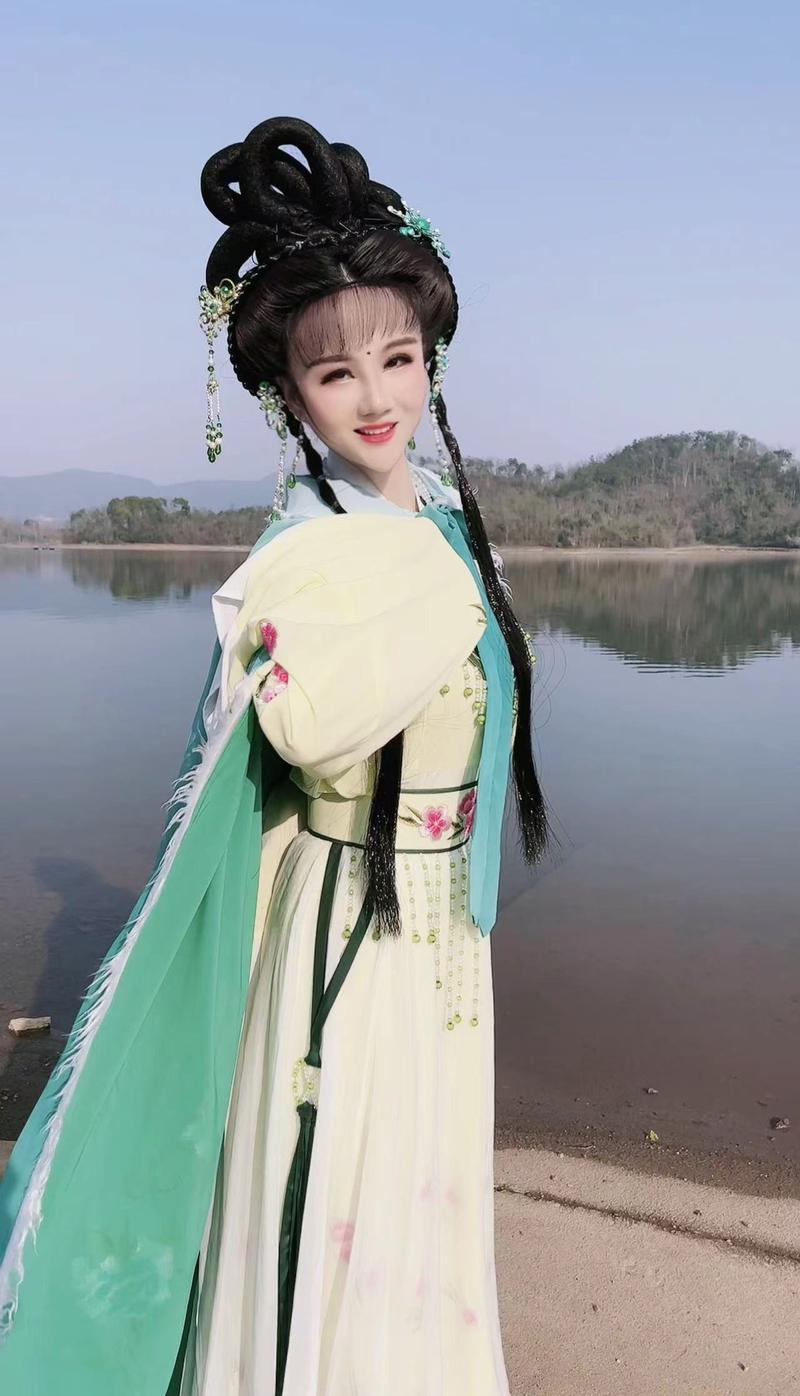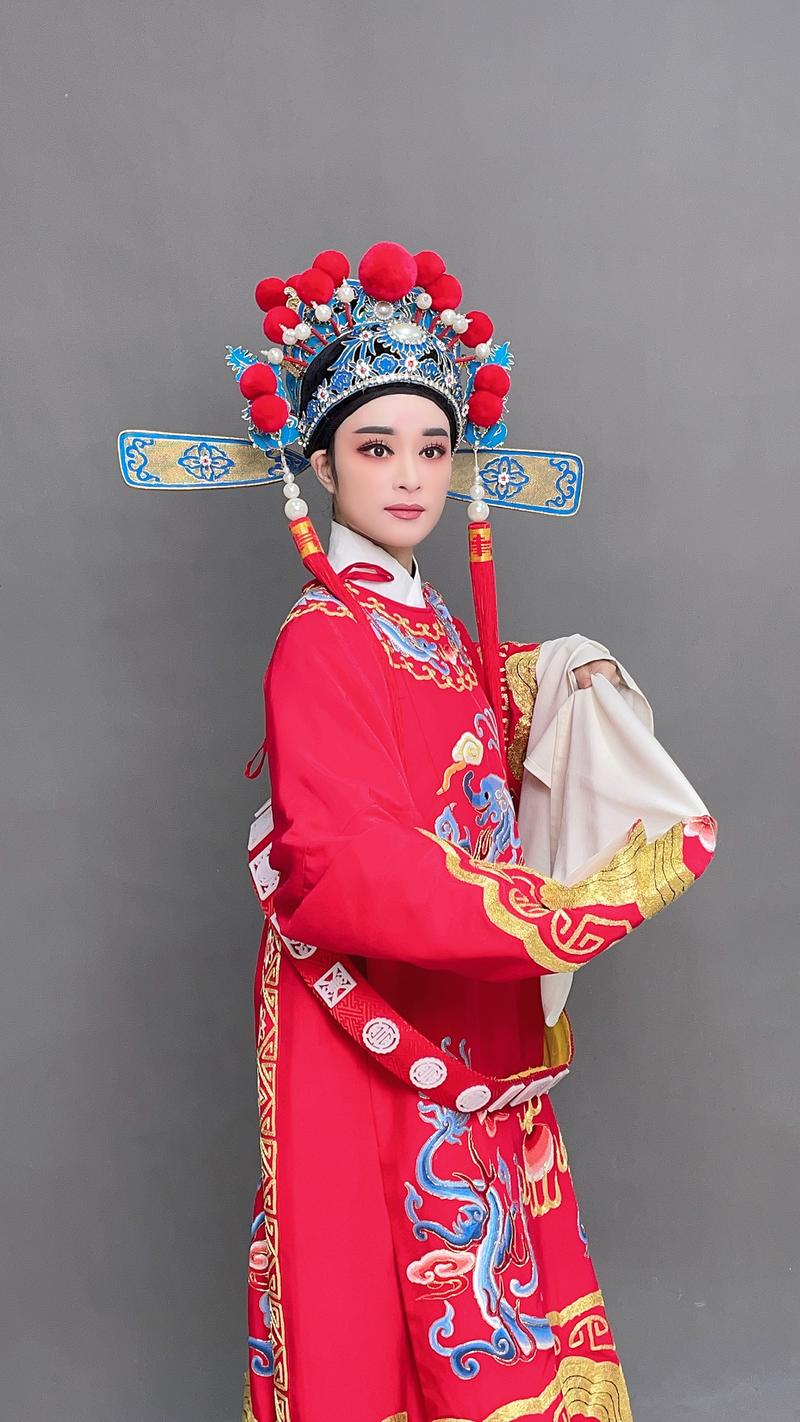Veteran performers and amateurs alike are promoting traditional art forms via livestreaming, Ye Zizhen in Beijing and Liu Kun in Wuhan report.
 Cheng Cheng dresses in traditional costume for a livestreaming performance of Huangmei Opera in a park in Huanggang, Hubei province. (PHOTO PROVIDED TO CHINA DAILY)
Cheng Cheng dresses in traditional costume for a livestreaming performance of Huangmei Opera in a park in Huanggang, Hubei province. (PHOTO PROVIDED TO CHINA DAILY)
After some four hours of getting her makeup done, an artist was about to meet her audience online. Starting in April last year, Chen Yu began to perform excerpts of Yueju Opera, a traditional art form popular in Zhejiang province and Shanghai, by livestreaming on short-video platform Douyin, which is known as TikTok overseas.
"At first, no one knew about me, and the number of audience was small," Chen says.
The influence of the internet in promoting knowledge and traditional culture, including operas ... is increasing through social media platforms.
Zhang Yiwu, a professor at Peking University
"But I continued singing, and I began to get messages. People noticed that I work hard, and I guess they were inspired by my spirit."
Chen, who was born in 1986 in Ningbo, Zhejiang, attended an art college in the city's Xiangshan county after junior middle school to learn how to perform Yueju Opera.
Almost daily for three years, starting at 5 am, she practiced singing and movement, gradually mastering the art form. For a time, she played a young male role, or xiaosheng, as part of a local opera troupe in Ningbo. But she lost her job because the shows were reduced as a result of the COVID-19 pandemic. So, she looked for alternatives.
"I loved Yueju Opera and performing, and didn't want to give it up," she says.
Along with many of her peers, Chen started livestreaming on Douyin. Her first performance drew a paltry audience of a few dozen. But her popularity suddenly exploded, and she has attracted an online fan base of more than 210,000.
Six days a week, her fans watch her livestreaming, either performing popular Yueju Opera excerpts or talking about the art form. One livestream session can last up to six hours.
"Livestreaming makes this traditional art form trendy and more promotable," she says.
However, she says she still hopes to return to the stage one day.
Zhang Yiwu, a professor at Peking University, says in an interview with The Beijing News: "The influence of the internet in promoting knowledge and traditional culture, including operas and other forms of intangible cultural heritage, is increasing through social media platforms."
Other traditional art forms have also become more visible as a result of social media.
 Chen Yu, an artist in Ningbo, Zhejiang province, attracts a growing fan base online with her livestreaming performances of Yueju Opera. (PHOTO PROVIDED TO CHINA DAILY)
Chen Yu, an artist in Ningbo, Zhejiang province, attracts a growing fan base online with her livestreaming performances of Yueju Opera. (PHOTO PROVIDED TO CHINA DAILY)
Cheng Cheng, a 31-year-old actress of Huangmei Opera in Huanggang, Hubei province, also performs via livestreaming.
In 2019, she happened to see one of her colleagues in a local theater company livestreaming a piano performance and noted the large audience.
At that time, Cheng had already uploaded several videos related to Huangmei Opera and had gained 80,000 fans. She says she thought livestreaming was the way forward.
"Performing onstage is different," she says.
"Audience size is limited and the chances to perform face-to-face are fewer because of the pandemic. But with livestreaming, I can sing in front of more people and tell them about Huangmei Opera."
Before she turned to livestreaming, Cheng would travel to different cities and provinces to perform on occasions, such as the opening of a new factory, festivals or weddings. The largest audience she had in a show was 10,000. However, on Douyin, a single post of her singing garners some 200,000 likes.
Besides livestreaming from indoors, she performs at local parks.
During a livestreaming session in December, one of her fans left a message, saying she showed Cheng's videos to her grandfather, who commented that he thought nowadays no one was performing such traditional art forms, but found that they were "hiding" in mobile apps.
Cheng says that through the messages left by the viewers, she realizes that many have little understanding of the opera when they first log in to her livestreaming sessions. Now, she is including talks on Huangmei Opera in the livestreaming.
Cheng says she comes across other performers on Douyin, and shares her experiences of performing online with them.
In addition to amateur enthusiasts, veteran opera artists and cultural inheritors have also turned to performing and teaching traditional art forms via the internet.
According to Douyin, last year, about 99 percent of different Chinese operas on the country's intangible cultural heritage list were performed on its platform.
The top five most-liked genres were Huangmei Opera, Peking Opera, Yuju Opera, Yueju Opera and Qinqiang Opera.
"Livestreaming provides more opportunities for young artists," Zhang Hui, Party secretary and head of the Hubei Huangmei Opera Theater, tells Chutian Metropolis Daily.
"Even though there are offline performances, the scale and time span of the shows is limited due to the pandemic."
Contributions of money by online viewers can provide young artists with incentives to enhance their skills and work harder to attract more followers, Zhang Hui says.
Contact the writers through yezizhen@chinadaily.com.cn


